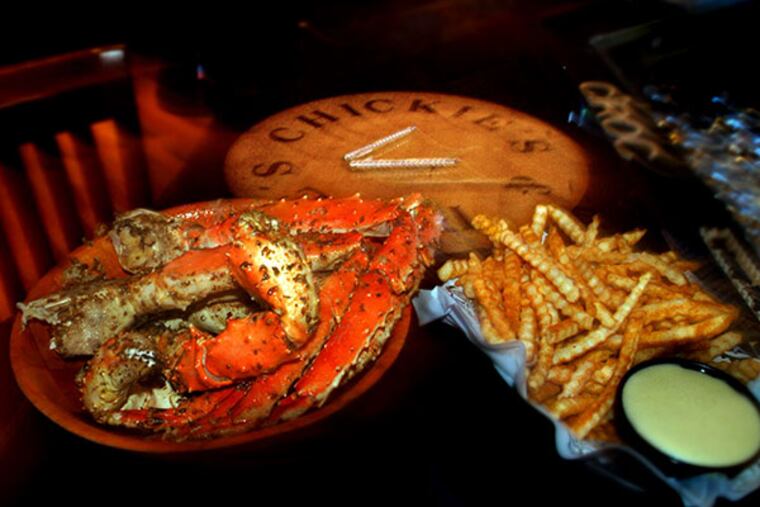Chickie's & Pete's to pay $8.5M in short-tipping case
"Pete's Tax" has proved costly. Chickie's & Pete's, the Philadelphia sports bar and restaurant chain, has agreed to pay $8.52 million in back wages and damages to employees for illegally docking a portion of their tips and failing to properly pay minimum wage, overtime, and other required income.

"Pete's Tax" has proved costly.
Chickie's & Pete's, the Philadelphia sports bar and restaurant chain, has agreed to pay $8.52 million in back wages and damages to employees for illegally docking a portion of their tips and failing to properly pay minimum wage, overtime, and other required income.
Of that amount, $6.8 million is to be paid to 1,159 past and present employees to resolve an investigation by the U.S. Labor Department. The remaining $1.68 million is to settle federal lawsuits by about 90 current and former employees.
Lost income to the workers at the chain's 12 outlets amounted to $4.5 million over two years, eight months, ending in December 2012.
The chain will also pay a $50,000 civil penalty to resolve what the Labor Department called "one of the largest tipped-employee investigations in recent years."
"Chickie's and Pete's behavior is troubling because they both unlawfully took tips from their workers and failed to pay them even the $2.13 per hour the law requires," said Laura Fortman, principal deputy administrator for the department's Wage and Hour Division. Rather, workers were paid $15 a shift, which did not meet the minimum when a shift exceeded seven hours.
The chain's owner, Peter Ciarrocchi Jr., called the settlement "the right thing to do."
"Our employees are the backbone of our company," Ciarrocchi said, "and they deserve our respect and appreciation. We believe these settlements are in their best interests, and we worked cooperatively with the DOL and with plaintiffs' counsel to make them happen."
The same statement said the chain cooperated with investigators from the start and voluntarily returned money to servers and bartenders for 2012.
The Labor Department settlement, signed Thursday but awaiting judicial approval, and the lawsuits stem from complaints that management was illegally taking tips from servers and failing to fully pay minimum wage and overtime for all employees when required.
Servers alleged that they were routinely docked 2 percent to 4 percent of total table sales, a practice employees routinely called "Pete's Tax."
The investigation found that the practice was an established part of the business' operations and that servers were expected to pay at the end of their shifts even when tips were not in cash but on credit card charges. As a result, servers sometimes had to borrow money from coworkers or take cash from ATMs to make their payments, according Brian Johnson, a regional director of enforcement for the Labor Department.
Of the tip money collected by management, about 40 percent went to bartenders on duty, which is legal, Johnson said, while management kept the rest.
The exact loss to employees could be calculated, Johnson said, because the chain "kept meticulous records of these tip out amounts."
"These just weren't violations," Johnson said. "This was part of [Ciarrocchi's] business model."
Beyond the tips that had been illegally collected, the chain was also found to have failed to pay workers minimum wage, proper overtime, and for time devoted to mandatory training and meetings.
As part of the Labor Department settlement, Chickie's & Pete's has agreed to three years of compliance monitoring and training for employees on their rights under the Fair Labor Standards Act, and to have Ciarrocchi write an article for a restaurant trade publication about an employer's obligation under the act.
That last provision is part of the larger message the Labor Department is trying to send, Johnson said.
"Tips are the property of the employees who received them," he said. "Taking a portion of those tips can have costly consequences for a restaurant owner. . . . Chickie's & Pete's is an industry leader. When they comply with the Fair Labor Standard Act, they set an example for all the restaurants in the area."
BY THE NUMBERS
$6.8M
Amount to be paid to 1,159 past and present employees.
$1.68M
Amount to settle federal lawsuits by about 90 current and former employees.
$4.5M
Income lost to workers at the chain's 12 outlets over two years, eight months ending in December 2012.EndText